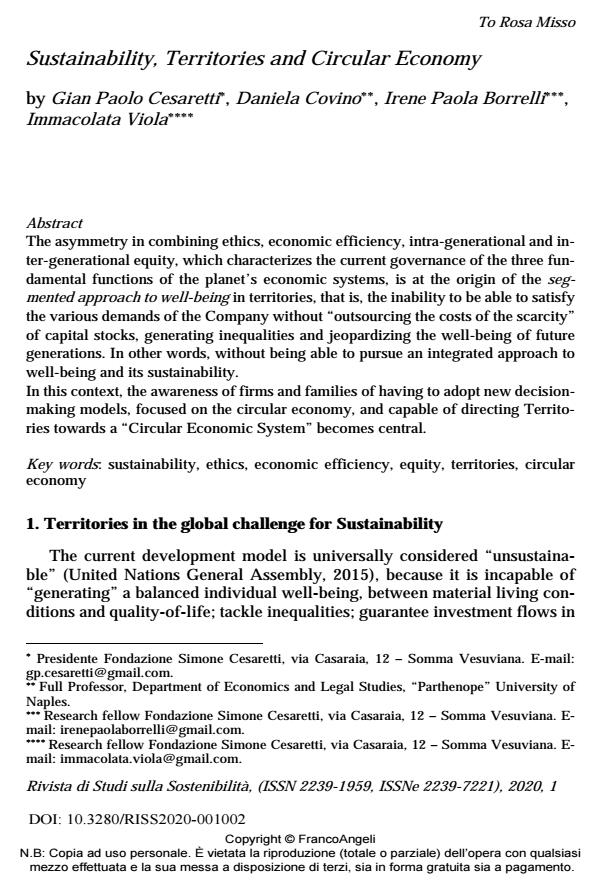Sustainability, Territories and Circular Economy
Journal title RIVISTA DI STUDI SULLA SOSTENIBILITA'
Author/s Gian Paolo Cesaretti, Daniela Covino, Irene Paola Borrelli, Immacolata Viola
Publishing Year 2020 Issue 2020/1
Language English Pages 18 P. 11-28 File size 186 KB
DOI 10.3280/RISS2020-001002
DOI is like a bar code for intellectual property: to have more infomation
click here
Below, you can see the article first page
If you want to buy this article in PDF format, you can do it, following the instructions to buy download credits

FrancoAngeli is member of Publishers International Linking Association, Inc (PILA), a not-for-profit association which run the CrossRef service enabling links to and from online scholarly content.
The asymmetry in combining ethics, economic efficiency, intra-generational and inter-generational equity, which characterizes the current governance of the three fundamental functions of the planet’s economic systems, is at the origin of the segmented approach to well-being in territories, that is, the inability to be able to satisfy the various demands of the Company without "outsourcing the costs of the scarcity" of capital stocks, generating inequalities and jeopardizing the well-being of future generations. In other words, without being able to pursue an integrated approach to well-being and its sustainability. In this context, the awareness of firms and families of having to adopt new deci-sion-making models, focused on the circular economy, and capable of directing Territories towards a "Circular Economic System" becomes central.
Keywords: Sustainability, ethics, economic efficiency, equity, territories, circular economy
- Borrelli I.P., Cesaretti G.P., Misso R. (2013). La sostenibilità del benessere: una questione complessa. Rivista di Studi sulla Sostenibilità, 1: 43-54. DOI: 10.3280/RISS2013-001004
- Borrelli I.P. (2013). Non omologazione dei sistemi locali e sostenibilità del benessere. Rivista di Studi sulla Sostenibilità, 1: 109-117.
- Buonocore G., Malinconico M., Silvestre M.C. (2017). Contenuti e contenitori: le nuove frontiere del packaging. Scienza&Società 23/24. Il cibo e/è l’uomo: Viaggio in un mondo di paradossi, 107.
- Campiotti C.A., Bibbiani C., Corinna V. (2016). Energy efficiency as option for improving sustainability of agrofood system. Quality – Access to Success, 17: 504-509.
- Cesaretti G.P. (2017). Territories facing the challenge of Sustainability – Insights and Suggestions. Rivista di Studi sulla Sostenibilità, 7(1): 7-9
- Cesaretti G.P., Misso R. (2018). Environmental issue and food issue in agenda 2030: circular economy, an efficient, efficacy, ethic and fair strategy. Journal of Environmental Protection and Ecology, 2: 31-42.
- Food and Agriculture Organization of the United Nations. (2011). Global food losses and food waste – Extent, causes and prevention. Food and Agricultural organization of the United Nations.
- Global Footprint Network. (2020). Earth overshoot day. -- https://www.over shootday.org.
- Grunert K.G. (2011). Sustainability in the food sector: A consumer behaviour perspective. International Journal on Food System Dynamics, 2(3): 207-218.
- Latini A., Campiotti A., Albanese A., Cavaleri F., Sirica E. (2019). Energy efficiency in the agro-industry. Energy efficiency in the agro-industry: 99-114.
- Lindgren E., Harris F., Dangour A.D., Gasparatos A., Hiramatsu M., Javadi F., Haines A. (2018). Sustainable food systems – a health perspective. Sustainability science, 13(6): 1505-1517.
- Margheri M. (2018). La disuguaglianza nel mondo e in Italia | Dati, cause e soluzioni. Associazione Le Nius.
- Misso R., Varlese M. (2018). Agri-food, plastic and sustainability 1. Calitatea, 19(S1), 324-330.
- Misso R., Cesaretti G. P., Andreopoulou Z. (2017). Facing ‘homologation’: A sustainable response by the genetic code of territories. Journal of Environmental Protection and Ecology, 18(1): 282-288.
- Misso R., Cesaretti G.P., Shakir H.S.H. (2015). Territorial Corporate Identity and New Food Paradigms. Territorial Corporate Identity and New Food Paradigms: 11-30.
- OECD (2011). How’s Life? Measuring well-being. OECD Publishing.
- Porter M.E. (1991). Il vantaggio competitivo delle nazioni. Mondadori, Milano.
- Shakir H.S.H., Harris K.T., Osborne-Lee I.W., Cesaretti G.P., Misso R., Khalil M.T. (2013). Global Ecological Footprint, Climate Change Impacts and Assessment. Rivista di Studi sulla Sostenibilità, 2: 9-38.
- Tourism Sustainability Group (2007). Action for more sustainable european tourism – Report of the Tourism Sustainability Group. Tourism Sustainability Group, Bruxelles.
- UNDP (2019). Human Development Report 2019, Beyond income, beyond averages, beyond today: inequalities in human development in the 21st century. United Nations development Programme.
- Unit E.I. (2020). Democracy Index 2019: A year of democratic setbacks and popular protest.
- United Nations General Assembly (2015). Transforming our world: the 2030 Agenda for Sustainable Development. Division for Sustainable Development Goals, New York.
- UNWTO (2008). UNWTO Tourism Highlights. United Nations World Tourism Organization, Madrid.
- Viola I., Marinelli A. (2015). Life Cycle Assessment and environmental sustainability in the food system. Agriculture and Agricultural Science Procedia, Volume 8, 2016: 317-323.
- Viola I., Simonetti B., Öztürk L. (2018). Sustainable jobs and tourism. Rivista di Studi sulla Sostenibilità, 2: 45-56. DOI: 10.3280/RISS2018-002004
- WCDE (1987). Our Common Future. Brundtland Commission – World Commission on Environment and Development.
- Willett W., Rockström J., Loken B., Springmann M., Lang T., Vermeulen S., ... Jonell M. (2019). Food in the Anthropocene: the EAT–Lancet Commission on healthy diets from sustainable food systems. The Lancet, 393(10170): 447-492.
Gian Paolo Cesaretti, Daniela Covino, Irene Paola Borrelli, Immacolata Viola, Sustainability, Territories and Circular Economy in "RIVISTA DI STUDI SULLA SOSTENIBILITA'" 1/2020, pp 11-28, DOI: 10.3280/RISS2020-001002